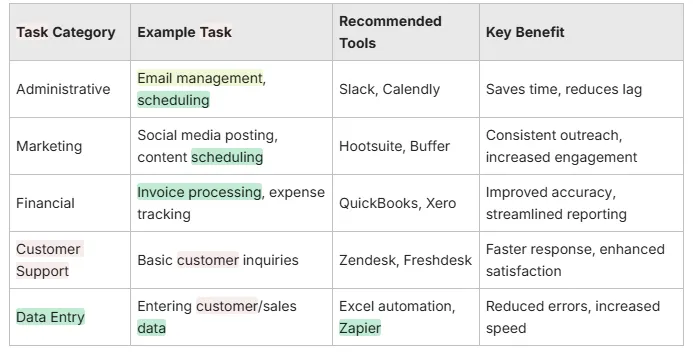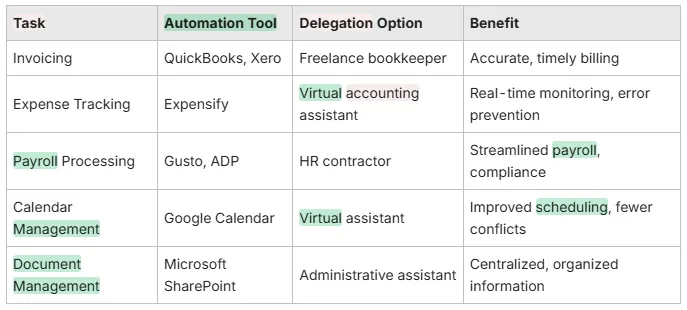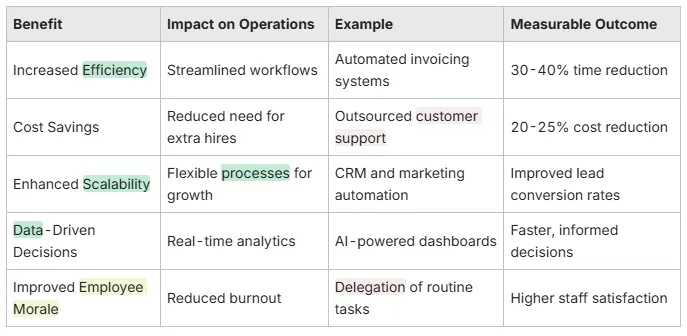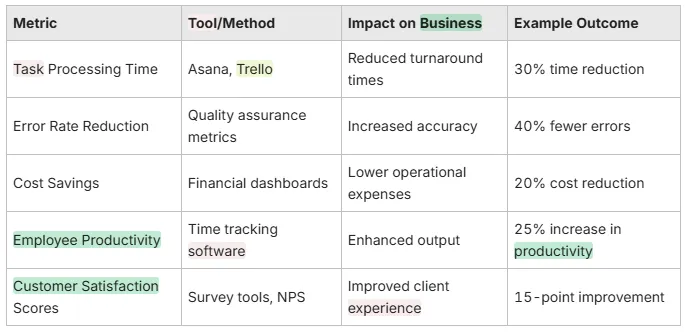Streamline your startup's operations with these 10 automation and delegation strategies. Learn how to boost ROI, reduce burnout, and scale smarter before your next hire.

10 Essential Tasks to Automate and Delegate Before Your Next Hire for Maximum Efficiency
In today’s rapidly evolving business environment, startups and small enterprises face mounting pressure to optimize operations, reduce overhead, and scale efficiently by leveraging global talent networks. With limited human resources, it becomes critical to implement SaaS-driven automation, intelligent task management, and strategic delegation before expanding internal teams. Platforms like ClickUp, Trello, Jira, Microsoft Teams, and ServiceNow are transforming how organizations manage projects, streamline onboarding, and orchestrate complex business processes across marketing, finance, and supply chain functions.
Business founders and productivity managers increasingly recognize that shifting routine, repetitive tasks—such as data entry, mailing list segmentation, inventory updates, purchase order processing, and email management—to workflow automation tools or delegating them to specialized offshore personnel boosts both usability and return on investment (ROI). This reduces management complexity and allows leadership to focus on high-impact initiatives such as brand growth, customer relationship management (CRM), and strategic thinking.
Technologies like robotic process automation (RPA), enterprise resource planning (ERP) systems, natural language processing (NLP), and machine learning now power the automation of high-frequency workflows. Automating repetitive tasks in areas like graphic design, finance, and digital marketing not only improves employee productivity and morale but also enhances the user interface (UI) and user experience (UX) across digital platforms. With drag-and-drop functionality and customizable cards, boards, and spreadsheets, automation software empowers employees to allocate energy and resources more effectively while reducing task turnover and burnout.
Email marketing campaigns, podcasts, and newsletter workflows can be streamlined with platforms like Zapier and Intuit, while budget tracking and data management are optimized using Microsoft Excel and database integration. These tools provide actionable insights through data analysis, helping identify automation-ready management tasks that free up time and ensure strategic alignment across departments.
Beyond productivity, intelligent automation improves access control, strengthens compliance, and supports seamless integration between digital assets and customer-facing systems. From employee engagement tracking to supply chain visibility and CRM pipelines, businesses are leveraging automation to gain a competitive edge in SEO-driven digital transformation strategies.
This article provides comprehensive insights into essential tasks that can be automated or delegated to reduce operational errors and drive scalable efficiency. Viewed from the perspective of a remote work productivity coach, we break down key functions across customer service, HR onboarding, finance, marketing, and digital operations. Each section includes performance benchmarks, resource allocation models, and process automation best practices to help leaders implement changes with confidence.
Key questions explored include: What automation tools yield the greatest ROI for startups? How does automating tasks enhance creativity and reduce employee turnover? Which business processes are ideal candidates for task automation tools like Zapier or ERP integrations? What role does critical thinking play in evaluating automation complexity?
Whether you're managing assets, designing workflows, building out your digital marketing engine, or scaling customer support across networks, this guide equips you with the strategies and software stack to move faster and smarter. For further details, tailored guidance, or implementation support, contact our team.
Transitioning now to the main exploration of automation and delegation strategies:
Which Business Processes Should You Automate First?
For any startup, automating repetitive and error-prone tasks using saas solutions and incorporating for-global-talent strategies can yield immediate ROI through increased efficiency and cost savings. Key processes ideal for automation include heavy data handling, routine scheduling, and standardized communications. By integrating shared services and tools like sinq, businesses minimize human error and free up skilled personnel for higher-value activities. For further inquiries, please contact our support team.
What Are the Top Repetitive Tasks to Automate in a Startup?
Startups commonly face repetitive tasks like data entry, email responses, appointment scheduling, social media posting, and handling basic customer inquiries, which require prompt contact with their users. Software tools—such as saas CRM systems and workflow automation solutions—can run these tasks automatically, providing shared services that benefit for-global-talent oriented companies. For instance, automated email responders like sinq acknowledge customer queries instantly, while scheduling software reduces the need for back-and-forth communications. Such tools often cut processing time by up to 40%, boosting overall productivity and lowering error rates.
How Can Automation Save Time and Reduce Errors?
Automation quickly processes large volumes of repetitive work without fatigue. Machines can execute precise, consistent actions that reduce human errors dramatically. In tasks like data entry or invoice processing, automated systems nearly eliminate errors and free up significant time. Real-time analytics and monitoring further help to identify and resolve discrepancies immediately, promoting continuous process improvement.
Which Tools Are Best for Automating Business Processes?
A range of software solutions are available for various business functions. Tools like Zapier and IFTTT create automated workflows for administrative tasks. CRM systems (e.g., HubSpot, Salesforce) manage lead capturing and follow-ups automatically, while accounting software such as QuickBooks or Xero streamlines invoicing and expense tracking. Project management platforms like Trello or Asana bring automation to task assignments. For marketing, platforms like Hootsuite auto-schedule social media posts and deliver performance analytics.
To summarize, automating repetitive and error-prone processes allows startups to reduce overhead and maintain reliability. The next step is to determine which tasks, being more strategic, are best delegated.
What Tasks Are Most Effective to Delegate Before Hiring?

Before expanding the team, startups should delegate tasks that do not require full-time attention and can be managed by external professionals or part-time help. Effective delegation maintains agility and cost control while ensuring routine tasks are handled by specialists—allowing leaders to focus on strategic initiatives.
How to Identify Time-Consuming Tasks to Delegate?
Business owners can identify delegate-worthy tasks by tracking daily activities. Simple time logs or tracking software may reveal excessive hours spent on routine data entry, website upkeep, content scheduling, or customer follow-ups. If administrative tasks consume more than 20% of working hours, they are strong candidates for delegation. Such analysis pinpoints low-value, time-intensive activities that automation and delegation can handle efficiently.
Who Should You Delegate Tasks to Within Your Startup?
Delegation should play to the strengths of an employee or contractor. Tasks like blog content creation, social media management, or basic accounting can often be managed by virtual assistants or experienced freelancers. Defining clear roles, measurable targets, and providing detailed instructions helps ensure smooth task handovers. Internal team members with adequate capacity may also be given additional responsibilities if they show high potential.
What Are Best Practices for Successful Delegation?
Successful delegation relies on clear communication, accountability, and digital collaboration tools. Platforms like Slack or Microsoft Teams help maintain efficient communication with remote teams, while project management tools like Asana or Monday.com enable task assignment and progress monitoring. Regular check-ins, documented processes, established deadlines, and automated reminders all contribute to a seamless delegation process.
Below is a table summarizing examples of tasks well-suited for delegation:

How Can Automating Customer Support Improve Startup Efficiency?
Strong customer support builds lasting client relationships. Automating customer support yields quicker responses, eases staff workload, and ensures consistent service quality. Advanced chatbots, automated ticketing systems, and AI-driven customer service platforms effectively manage routine queries while human agents address complex issues.
Which Customer Support Tasks Can Be Automated?
Automation in customer support can handle ticket triaging, faq responses, and follow-ups. Chatbots on websites answer questions about product features or return policies instantly, while automated ticketing systems route more complex issues appropriately. Voice assistants and AI systems extend support beyond business hours, ensuring customers always receive timely assistance.
What Are the Benefits of Delegating Customer Service Roles?
While routine queries can be automated, complex issues benefit from a human touch. Delegating customer service tasks to experienced virtual assistants or specialized agencies ensures that personalized support is available when needed. This blended approach—automation for routine interactions and human input for intricate issues—maintains high service standards and helps control costs during peak periods.
What Financial and Administrative Tasks Should You Automate or Delegate?

Financial and administrative functions are critical for maintaining credibility with customers, investors, and regulatory bodies. Automating these tasks reduces manual errors and speeds up processes, while delegation frees internal resources for strategic planning. Tasks like invoicing, expense tracking, payroll, and data management are ripe for automation and delegation.
How to Automate Invoicing and Expense Tracking?
Accounting software like QuickBooks or Xero automates invoicing by generating recurring bills and sending payment reminders. Automated expense tracking allows employees to upload receipts via mobile apps, which are then categorized and reconciled with bank statements. This minimizes manual errors, ensures real-time updates, and enhances financial reporting.
Which Administrative Tasks Are Ideal for Delegation?
Routine administrative tasks such as calendar management, travel bookings, document formatting, note-taking, and basic research can be effectively delegated to virtual assistants or freelance administrative professionals. Utilizing cloud-based solutions like Google Workspace or Microsoft Office 365 further facilitates efficient delegation with shared documents and calendars.
How Does Automation Improve Financial Accuracy?
Replacing manual processes with automated systems sharply reduces transactional errors. Features like preset rules and audit trails ensure every invoice or expense conforms to standards, building trust with stakeholders and enabling data-driven decisions.
Below is a table summarizing common financial and administrative tasks with their associated benefits:

How to Automate Marketing and Social Media Tasks Before Hiring?
Marketing and social media are vital for brand engagement. Automating routine tasks such as scheduling posts, tracking analytics, and managing email marketing can make a significant difference in efficiency for startups with limited resources.
What Marketing Tasks Can Be Automated for Startups?
Tools like Hootsuite and Buffer allow startups to plan and schedule social media posts ahead of time, ensuring consistent online engagement. Email marketing platforms such as Mailchimp or ActiveCampaign send personalized emails to segmented lists. Automated lead nurturing systems can funnel prospective clients through a series of informational emails, significantly boosting conversion rates.
How to Delegate Content Creation and Social Media Management?
Not all marketing tasks are suited to automation. Creative tasks like content creation and strategic social media engagement require human insight. By delegating these tasks to specialized virtual assistants or freelance content creators, startups can ensure that creative quality is maintained while routine tasks are automated. Clear production guidelines and regular content reviews help keep brand messaging consistent.
Below is a list summarizing key marketing tasks and the benefits of blending automation with delegation:
1. Social Media Post Scheduling – Use Buffer; delegate daily content curation.
2. Email Campaign Management – Automate sequences via Mailchimp; delegate copywriting.
3. Website Analytics and Reporting – Automate tracking with Google Analytics; delegate monthly reviews.
4. Content Distribution – Automate blog shares via RSS; delegate influencer outreach.
5. PPC Campaign Monitoring – Automate bid adjustments with AdEspresso; delegate strategy planning.
Benefits of a Blended Automation and Delegation Approach
Combining automation for routine marketing tasks with delegated creative efforts ensures efficient resource allocation, real-time performance tracking, and preserved creative nuance.
Which Sales and Lead Generation Tasks Should You Automate or Delegate?

Sales and lead generation are crucial for business growth. A strategic mix of automation and delegation in these areas can boost lead conversion and customer relationship management while reducing the need for extensive manpower during growth periods.
How Can CRM Automation Boost Sales Efficiency?
CRM automation tools such as Salesforce and HubSpot automatically log interactions, categorize leads, and even predict customer behavior with data analytics. Automated follow-up emails and reminders ensure that no lead is overlooked, allowing sales teams to concentrate on high-value prospects and personalized selling, thereby shortening the sales cycle.
What Sales Tasks Are Best Delegated to Freelancers or Assistants?
Tasks that benefit from personal attention—initial outreach personalization, proposal drafting, and detailed customer follow-ups—are best delegated. Freelance sales professionals can handle market research and relationship management, ensuring each sales opportunity receives a human touch that boosts conversion rates.
A brief list of sales tasks suitable for delegation includes:
1.Lead Data Entry – Automate data capture; delegate quality control.
2. Follow-Up Email Sequences – Automate basics; delegate personalized messaging.
3. Appointment Scheduling – Automate online booking; delegate confirmation calls.
4. Proposal Drafting – Delegate initial drafts; use CRM templates.
5. Customer Research – Automate basic monitoring; delegate detailed analysis.
How to Prepare Your Startup for Growth by Automating and Delegating Early?
Scaling a startup requires building an efficient operational framework from the beginning. Early adoption of automation and delegation builds the infrastructure necessary for rapid growth without common pitfalls like overloaded processes or mismanaged tasks.
Why Is Pre-Hire Automation Critical for Startup Scalability?
Pre-hire automation allows startups to manage increased workloads without immediately expanding the workforce. By optimizing existing processes, new hires can focus on strategic initiatives rather than routine functions, proving that the business can scale efficiently with current resources.
How Does Delegation Free Up Time for Strategic Planning?
Delegating routine tasks to capable assistants—whether internal or outsourced—frees up management time for strategic planning, market expansion, and product development. This shift ensures that leadership stays focused on high-impact decisions, guided by data-driven insights.
What Are the Long-Term Benefits of Early Automation and Delegation?
Early automation and delegation foster a flexible, scalable operation that enhances efficiency, reduces errors, and improves employee morale by preventing burnout. Companies benefit from higher productivity, fewer errors, and improved customer satisfaction, all of which pave the way for sustainable growth.
Below is a table outlining long-term benefits:

What Are Common Mistakes to Avoid When Automating and Delegating Tasks?

Despite the benefits, pitfalls in automation and delegation can compromise customer experience and cause inefficiencies. It is important to balance technological automation with human oversight and continuously monitor results.
How to Prevent Over-Automation That Hurts Customer Experience?
Excessive automation can lead to impersonal customer interactions. Companies must identify tasks that benefit from human intervention, such as complex problem resolution or sensitive negotiations, and maintain a balance through regular reviews and customer feedback.
What Are Delegation Errors That Can Delay Startup Growth?
Delegation can falter if tasks are assigned without clear guidelines or follow-up. Common errors include assigning work to unqualified personnel or failing to communicate expectations, resulting in miscommunication and inefficiencies. Documenting processes and setting measurable objectives are key to avoiding these pitfalls.
How to Monitor and Adjust Automated Processes Effectively?
Establish KPIs and use real-time dashboards to monitor automated processes. Regular audits and periodic reviews allow businesses to fine-tune systems to address discrepancies, ensuring continuous improvement and alignment with strategic goals.
How to Measure the Success of Your Automation and Delegation Efforts?
It is crucial to use clear metrics to evaluate the impact of automation and delegation. Key performance indicators should target time savings, error reduction, and cost savings, providing a direct measure of improvements.
Which Metrics Indicate Improved Efficiency?
Metrics such as reduced processing times, lower error rates, and cost savings are central to assessing improved efficiency. Additionally, high customer satisfaction and enhanced employee productivity can be measured against pre-automation baselines.
How to Use Feedback to Refine Delegated Tasks?
Regular feedback from both customers and staff enables adjustments in task delegation. Periodic reviews and structured surveys help identify areas needing improvement, ensuring tasks align with quality standards and strategic goals.
What Tools Help Track Automation ROI?
Tools like Monday.com, Asana, Tableau, and Power BI turn raw data into visual reports that clearly demonstrate the benefits of automation through improved performance metrics and cost reductions.
Below is a summary of essential metrics and tools:

Frequently Asked Questions
Q: What are the primary benefits of automating repetitive business tasks? A: Automating repetitive tasks saves time, reduces errors, and ensures consistency, allowing employees to focus on more complex, high-value projects while leveraging data-driven insights.
Q: How do startups decide which tasks to delegate versus automate? A: Startups typically automate highly repetitive, error-prone tasks and delegate those that require a personal touch or creative input. Reviewing time logs and productivity helps determine the best approach.
Q: What role does feedback play in optimizing delegated tasks? A: Feedback from customers and staff is essential for refining delegated tasks. Regular reviews help ensure that the quality and effectiveness of these tasks meet business objectives.
Q: Can automation and delegation coexist without affecting customer experience? A: Yes, a balanced approach that uses automation for routine tasks and human oversight for more complex, customer-facing interactions preserves a personalized customer experience.
Q: Which is more cost-effective, hiring new employees or outsourcing tasks via automation and delegation? A: For early-stage startups, outsourcing through automation and delegation is often more cost-effective as it minimizes full-time hires while providing access to specialized skills and scalable technology.
Q: How often should a startup review and adjust its automation and delegation strategies? A: It is recommended to review strategies quarterly using performance metrics and feedback to ensure continuous improvement and sustained operational efficiency.
Q: What are some indicators that suggest a startup is ready to hire instead of continuing delegation? A: When task volumes consistently exceed current automation and delegation capacities, or when personalized interaction becomes crucial to customer satisfaction, it may be time to consider hiring full-time roles.
Final Thoughts
Automation and delegation are essential strategies for startups aiming to improve efficiency without incurring unnecessary overhead. By systematically identifying and addressing repetitive tasks, businesses can free valuable resources for strategic innovation. With a balanced mix of automated systems and skilled human intervention, companies reduce errors, boost customer satisfaction, and maintain a competitive edge—all of which lay the foundation for sustainable, ongoing operational excellence.
Latest insights from our articles
Explore a collection of curated articles that keep you engaged and informed about the latest trends in social media marketing.
.png)

Discover why AI skills are essential for modern virtual assistants. Learn how AI literacy drives productivity, innovation, and value in digital operations for startups and enterprises.

Discover why a hybrid virtual assistant is the smartest first ops hire for fast-scaling startups. Learn how they streamline operations, tech, and compliance.
.jpg)
Discover how top executives leverage virtual assistants—from calendar management to global market research—to free up time, enhance execution, and scale operations seamlessly.


